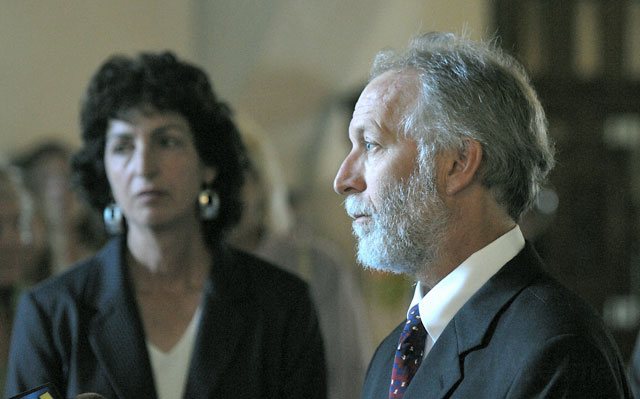Judge Rules in Favor of Naples Development
Attorneys and Environmentalists Vow to Keep Fighting to Preserve Stretch of Gaviota Coast

Plans to put several dozen mansions at the eastern gate of the Gaviota Coast remain very much alive this week after a ruling was handed down in a Santa Barbara Superior Courtroom. There was a chance Tuesday morning that a deathblow would be delivered to the long-stewing, highly controversial, and county supervisor–approved development dreams for the Naples property, easily the highest profile hunk of land in the Gaviota region.
However, in the end, Judge Thomas Anderle opted to disagree with many of the claims levied in a lawsuit challenging certain legalities of the supervisors’ 2008 approval of a plan to build 71 large-scale luxury homes, guest houses, garages, and an equestrian center on the historic and publicly beloved coastal ranch. Talking to the media in the hallway after the ruling, Linda Krop of the Environmental Defense Center (EDC), one of the lead attorneys in the nearly four-year-old lawsuit seeking to overturn the widely bemoaned approval, downplayed the significance of the setback. “The fight to save Naples is far from over,” explained Krop. “This decision made today was a very narrow one. … We are still going to go to the Coastal Commission, and we are likely to end up in the Court of Appeal.”
The EDC, on behalf of the Surfrider Foundation and in concert with Naples Coalition lawyer Marc Chytilo, filed a lawsuit in December 2008, less than two months after the supes, led by then–3rd District Supervisor Brooks Firestone, approved the Naples plan with a 3-2 vote. Among their complaints were allegations that the county had violated several mandates of the California Environmental Quality Act (CEQA) when it approved the Naples plan without properly evaluating possible project alternatives, without fully exploring green house gas emissions related to the development, or examining the potential impacts of some last-minute project tweaks that included a quadrupling of soil grading. They additionally argued that the approval was made despite the project’s conflict with terms of the county’s own General Plan and the fact that the plan was bifurcated (i.e., the inland portions of it separated from the coastal portions in terms of the permitted building timeline) after the associated Environmental Impact Report was certified.
And while the ground beneath that approval has shifted radically toward being less conducive to actual development in the years since — thanks to, among other things, hopeful Naples conqueror Matt Osgood defaulting on his loan, the Missouri-based First Bank assuming control of the property and currently shopping it, and the decidedly more enviro-minded Doreen Farr replacing Firestone on the Board of Supervisors — the impetus for the lawsuit, in the eyes of the EDC and Chytilo, has not. As EDC lawyer Nathan Alley summed up in court on Tuesday, “The county made both errors of fact and law [when it approved this plan]. … They are of extreme prejudice, and they cut to the very heart of what the CEQA process is all about.”
Unfortunately for those who would like to see the approval thrown out, Judge Anderle issued a tentative ruling late Sunday that dismissed most of the lawsuit’s claims and then, within seconds of the EDC and Chytilo concluding their arguments on Tuesday morning, stated simply in the direct, no-nonsense, rapid-fire tone that is his calling card, “I am going to stand with my tentative.” The only two claims he opted not to rule against — the legality of the fact that the as-approved project no longer includes a public beach access plan and whether or not a Coastal Development Permit is needed for the various lot mergers associated with the plan — he chose to simply take a flier and kick them on to the Coastal Commission for a final decision.
Though the rulings were anything but good news for the Save Naples camp, it seems, at least according to their legal teams, the loss was not nearly as significant of a development as a victory would have been in terms of achieving their overarching goal of preventing wide-ranging build-out on the mostly untouched property. “It is a setback, but it is certainly not fatal,” said Chytilo in the wake of the hearing. “There are still many, many hurdles to be cleared before the whole development can move forward.”



